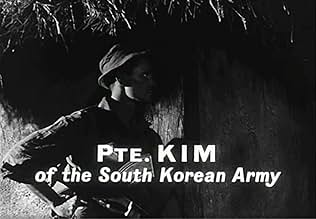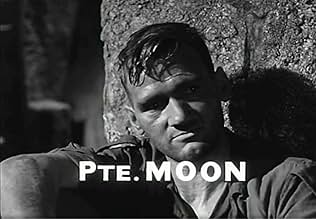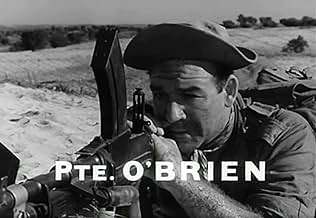IMDb-BEWERTUNG
6,1/10
651
IHRE BEWERTUNG
Füge eine Handlung in deiner Sprache hinzuDuring the Korean War retreat in 1951, a small British recon group is surrounded by Chinese troops and holds out in a lonely temple atop a hill.During the Korean War retreat in 1951, a small British recon group is surrounded by Chinese troops and holds out in a lonely temple atop a hill.During the Korean War retreat in 1951, a small British recon group is surrounded by Chinese troops and holds out in a lonely temple atop a hill.
Empfohlene Bewertungen
It's 1951, and the Allies are on the retreat from the Yalu, with massive Chinese forces pursuing them south. A small unit of British troops is sent to reconnoitre a Korean village, and gets caught by two advancing Chinese battalions.
For all the formulaic treatment of soldiers maintaining a chirpy stoicism in adverse combat conditions, this film does have a certain gritty realism. George Baker as the rookie lieutenant burdened by command, and Harry Andrews as the tough old sergeant, are first-class. Don't blink, or you'll miss a very young Michael Caine as Private Lockyer, lamenting the death of Corporal Ryker (Stanley Baker).
The film works as a simple narrative of men under fire, but it certainly has some shortcomings. The narration which launches events may save the time and effort of explaining the plot, but would it not have been better for this information to emerge naturally out of the drama? When the hut explodes, there is a very obvious jump-cut. During the interval needed to get the actor out of the danger area, someone jolted the camera! Would the Chinese soldiers, even with their advantage in limitless canon-fodder, attack so recklessly across open, flat ground? At one point, close-ups are inserted to enhance the human reactions of the soldiers, but the trouble is, the lighting conditions do not match those of the master shot. Once the British soldiers retreat to the temple on the hill, the whole proceedings become totally studio-bound, with Shepperton fibreglass passing for buddhist architecture. The air strike relies too heavily on monotonously-repeated library footage of American planes. When the ending comes, it is a surprise in the wrong sense - the resolution is unconvincing, almost as if the film-makers didn't know how to extricate the soldiers. Surely a few bombs wouldn't clear the Chinese away for miles around?
Ronald Lewis plays Wyatt, the misfit who didn't want to be a soldier and who gets everything wrong. This character is needed in one sense, because there has to be some internal tension within the British camp, but Wyatt is not well done. His apostasy is overly-dramatic, and his immolation utterly unbelievable. This attempt to inject gaudy emotion into a basically stiff-upper-lip story just doesn't come off.
Verdict - Interesting 1956 British 'take' on recent war which ultimately succeeds, despite its flaws.
For all the formulaic treatment of soldiers maintaining a chirpy stoicism in adverse combat conditions, this film does have a certain gritty realism. George Baker as the rookie lieutenant burdened by command, and Harry Andrews as the tough old sergeant, are first-class. Don't blink, or you'll miss a very young Michael Caine as Private Lockyer, lamenting the death of Corporal Ryker (Stanley Baker).
The film works as a simple narrative of men under fire, but it certainly has some shortcomings. The narration which launches events may save the time and effort of explaining the plot, but would it not have been better for this information to emerge naturally out of the drama? When the hut explodes, there is a very obvious jump-cut. During the interval needed to get the actor out of the danger area, someone jolted the camera! Would the Chinese soldiers, even with their advantage in limitless canon-fodder, attack so recklessly across open, flat ground? At one point, close-ups are inserted to enhance the human reactions of the soldiers, but the trouble is, the lighting conditions do not match those of the master shot. Once the British soldiers retreat to the temple on the hill, the whole proceedings become totally studio-bound, with Shepperton fibreglass passing for buddhist architecture. The air strike relies too heavily on monotonously-repeated library footage of American planes. When the ending comes, it is a surprise in the wrong sense - the resolution is unconvincing, almost as if the film-makers didn't know how to extricate the soldiers. Surely a few bombs wouldn't clear the Chinese away for miles around?
Ronald Lewis plays Wyatt, the misfit who didn't want to be a soldier and who gets everything wrong. This character is needed in one sense, because there has to be some internal tension within the British camp, but Wyatt is not well done. His apostasy is overly-dramatic, and his immolation utterly unbelievable. This attempt to inject gaudy emotion into a basically stiff-upper-lip story just doesn't come off.
Verdict - Interesting 1956 British 'take' on recent war which ultimately succeeds, despite its flaws.
Stalwart little "Sunday Afternoon" war film with all the right ingredients - excellent cast of British character actors with requisite mix of seasoned pro's (Andrews, Landis, Maddern) and young up & comers (Boyd, Shaw, Caine), simple but gripping plot with salty "it's-a-dog's-life-in-the-army-but-orders-is-orders" dialogue, well staged action scenes, "friendly" US planes bombing British troops etc etc. Well worth an hour or so of your time.
A Hill in Korea (AKA: Hell in Korea) is directed by Julian Amyes and adapted to screenplay by Anthony Squire, Ronald Spencer and Ian Dalrymple from the Max Catto novel. It stars George Baker, Harry Andrews, Stanley Baker, Michael Medwin, Ronald Lewis, Stephen Boyd and Victor Maddern. Music is by Malcolm Arnold and cinematography by Freddie Francis.
Out of British Lion Films, film is based on real events. Story follows a small group of British soldiers serving in the Korean War, who while out on routine patrol find themselves boxed in on all sides by the Chinese army. Against the odds the men, from different walks of life, must stand together to stand any chance of survival.
A Hill in Korea is more concerned with the conflict amongst the group of soldiers than it is with the enemy. 16 men, 10 of which are National Service conscripts, laugh, bicker, get scared and stand tall in readiness for what fate has in store for them. The upper crust and the working class thrust together makes for potent character dynamics, and of course it's a time when heroes and villains are born. This is a place where men apologise for getting injured, where they are told to fire their weapon instead of making love to it! And a place from which we know some will not return...
One of the very first films to deal with British troops in Korea (if not the first?), it inevitably has a familiarity about it if you be someone who often indulges in the War genre. However, the traditional flavours make this very appetising and the screenplay isn't shy of intelligence. Be it "friendly fire" or monologues about the futility of it all, film doesn't cop out. It's also very funny, with some absolute zingers delivered with caustic obviousness. Then there's the roster of great British actors that fill out the cast, with even the likes of Michael Caine (a real life servant in Korea) and Robert Shaw in secondary support slots. While Amyes keeps his camera up close for impact and Francis tones down the lighting to keep things sombre.
Well worth seeking out by fans of Brit war movies. 7/10
Out of British Lion Films, film is based on real events. Story follows a small group of British soldiers serving in the Korean War, who while out on routine patrol find themselves boxed in on all sides by the Chinese army. Against the odds the men, from different walks of life, must stand together to stand any chance of survival.
A Hill in Korea is more concerned with the conflict amongst the group of soldiers than it is with the enemy. 16 men, 10 of which are National Service conscripts, laugh, bicker, get scared and stand tall in readiness for what fate has in store for them. The upper crust and the working class thrust together makes for potent character dynamics, and of course it's a time when heroes and villains are born. This is a place where men apologise for getting injured, where they are told to fire their weapon instead of making love to it! And a place from which we know some will not return...
One of the very first films to deal with British troops in Korea (if not the first?), it inevitably has a familiarity about it if you be someone who often indulges in the War genre. However, the traditional flavours make this very appetising and the screenplay isn't shy of intelligence. Be it "friendly fire" or monologues about the futility of it all, film doesn't cop out. It's also very funny, with some absolute zingers delivered with caustic obviousness. Then there's the roster of great British actors that fill out the cast, with even the likes of Michael Caine (a real life servant in Korea) and Robert Shaw in secondary support slots. While Amyes keeps his camera up close for impact and Francis tones down the lighting to keep things sombre.
Well worth seeking out by fans of Brit war movies. 7/10
A war film starring Ronald Lewis, Stanley Baker, with no women characters, it sounds a gritty war film in the line of THE LONG, THE SHORT AND THE TALL, YESTERDAY'S ENEMY, another war movie starring Stanley Baker, or any Robert Aldrich or Samuel Fuller's films like plots. Rough, tough, brutal, virile stories about soldiers friendship, brotherhood of arms, sacrifice, bravery...And it is. I don't know the director but it is a pure delight to watch this war feature in the tradition of the small budget war features, focusing on characters, their relationships, their feelings.... Don't miss this one please, but I know it is a very hard to find item. And the most fascinating for me was having Stanley Baker and Robert Shaw together, bcause I have always associated them very close in my spirit; as Paul Newman and Steve McQueen, same kind of actors for same kinds of characters in the movies.
If nothing else this is a good little 50's British actioner. There's actually a couple of hills defended in the film. A smaller one in the first half by 4 of the soldiers and then a larger one in the second half, which is also the site of a Buddhist temple.
This is actually the first British war film I can remember seeing set in the Korean War. As others have mentioned, for a very much "B" feature, it has an A cast list, with the added bonus of seeing Robert Shaw and Michael Caine in a couple of their earliest roles. Keep your eyes peeled for Shaw, as his character doesn't last too long into the film.
It's a relatively brief film and the narrative doesn't delve much into the status of the platoon serving under the UN Flag, nor exploring to a great extent the fact that some of the soldiers were regular army and some were apparently national conscripts. The story really could have been fleshed out more. It's pretty lean and sparse, with very little backgrounding. But punters are unlikely to get bored watching it.
This is actually the first British war film I can remember seeing set in the Korean War. As others have mentioned, for a very much "B" feature, it has an A cast list, with the added bonus of seeing Robert Shaw and Michael Caine in a couple of their earliest roles. Keep your eyes peeled for Shaw, as his character doesn't last too long into the film.
It's a relatively brief film and the narrative doesn't delve much into the status of the platoon serving under the UN Flag, nor exploring to a great extent the fact that some of the soldiers were regular army and some were apparently national conscripts. The story really could have been fleshed out more. It's pretty lean and sparse, with very little backgrounding. But punters are unlikely to get bored watching it.
Wusstest du schon
- WissenswertesOpening credits prologue: "This film is dedicated to National Servicemen and Drafted Men of the Free Nations past, present and to come."
- PatzerThe troop enter a (mostly deserted) Korean village, finding a couple of innocent peasants. One soldier breaks the door of a shack, which the 'peasants' had booby trapped. The entry of the soldier and subsequent explosion are a jump cut, with the edit visible between the two shots, as the light and shadows had moved between filming each shot.
- VerbindungenFeatured in The Many Faces of...: Michael Caine (2011)
Top-Auswahl
Melde dich zum Bewerten an und greife auf die Watchlist für personalisierte Empfehlungen zu.
- How long is Hell in Korea?Powered by Alexa
Details
- Erscheinungsdatum
- Herkunftsland
- Sprache
- Auch bekannt als
- Hell in Korea
- Drehorte
- Shepperton Studios, Shepperton, Surrey, England, Vereinigtes Königreich(studio: made at Shepperton Studios. England.)
- Produktionsfirmen
- Weitere beteiligte Unternehmen bei IMDbPro anzeigen
- Laufzeit1 Stunde 21 Minuten
- Farbe
- Seitenverhältnis
- 1.37 : 1
Zu dieser Seite beitragen
Bearbeitung vorschlagen oder fehlenden Inhalt hinzufügen

Oberste Lücke
By what name was An vorderster Front (1956) officially released in India in English?
Antwort
































